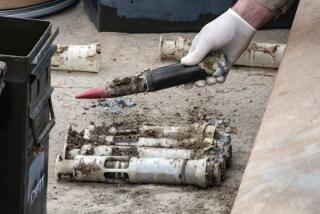Ex-Soviet Brass Resents U.S. Offer of Help With A-Arms
- Share via
WASHINGTON — While insisting they are concerned about nuclear proliferation, the leaders in charge of the old Soviet nuclear arsenal are “clearly resentful” of U.S. efforts to increase security and have rebuffed American overtures of help to prevent the weapons’ spread to the Third World, U.S. officials said Thursday.
The cold response from military leaders in the former Soviet republics and the lack of attention to the issue by Russian Federation President Boris N. Yeltsin alarms some defense experts, who say that loss of nuclear materials or scientists is a low priority in the struggling republics.
“It’s so chaotic, I’m not sure that anybody would even realize it, if anything were gone,” said Rep. Les Aspin (D-Wis.), the chairman of the House Armed Services Committee who recently returned from meetings in the republics. “Let me tell you, it won’t take a lot” for Third World powers to obtain nuclear materials in the confusion, Aspin said.
For civilian leaders like Yeltsin, whom Aspin described as a “transitional” figure in the politics of the new Commonwealth of Independent States, the security of nuclear weapons and materials is “about No. 15 or 16” on a long list of their urgent priorities, he added.
His remarks were the first public signs of discord in the consultations between the powers about Soviet nuclear technology. The comments came as a team of U.S. nuclear weapons experts met in Moscow for the second day with Commonwealth military representatives in a long-delayed effort to gauge their need for $400 million in American aid to help dismantle and dispose of weapons.
While some top Pentagon officials acknowledged that their efforts have been greeted coldly by Commonwealth military leaders, they said they see no cause for alarm. The military officials in the republics have managed to maintain control of their nuclear arsenal and expertise so far, and they may not need outside help, said one U.S. official.
Nevertheless, Aspin described Air Marshal Yevgeny I. Shaposhnikov, the interim commander in chief of the former Soviet forces, as “very grudging” and “not very friendly” when visiting congressmen suggested that his forces should accept American technical aid.
Lawmakers like Aspin have exhorted the Bush Administration to respond with stepped-up efforts to assist in dismantling of nuclear weaponry. But Administration officials have been reluctant to force U.S. aid on a resistant Commonwealth military.
More to Read
Sign up for Essential California
The most important California stories and recommendations in your inbox every morning.
You may occasionally receive promotional content from the Los Angeles Times.











